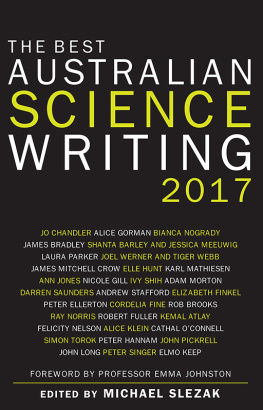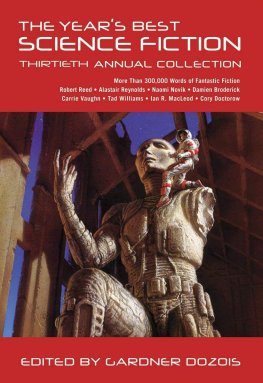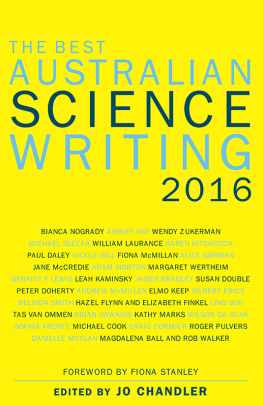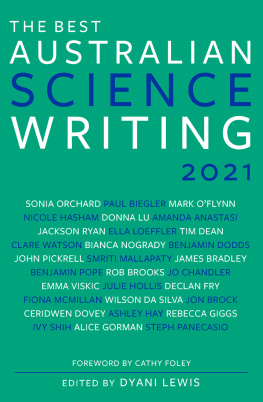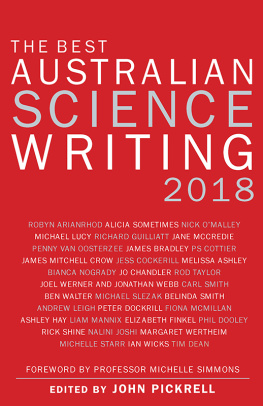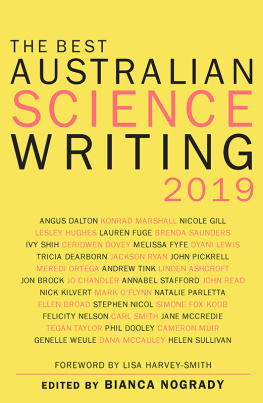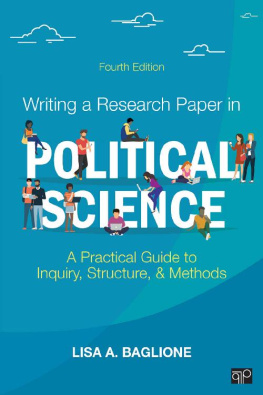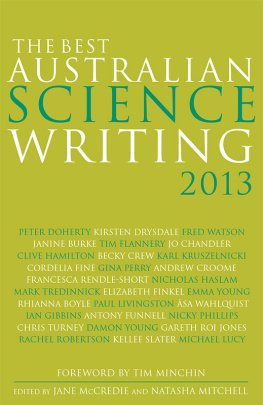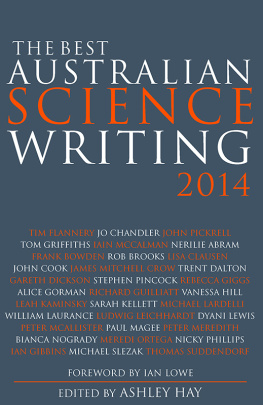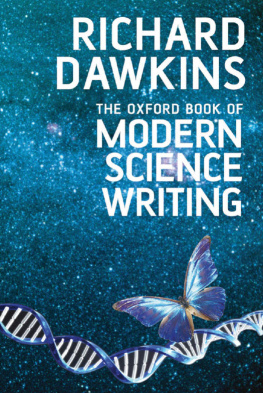
M ICHAEL S LEZAK is a multi-award-winning science and environment reporter. Since 2016 he has been reporting on environmental science and policy for the Guardian Australia. Before that, he was the Australasian correspondent for New Scientist magazine, reporting on all aspects of science and its effect on the world. Prior to that, he was a medical journalist and also freelanced on a variety of topics for publications around the world.

A NewSouth book
Published by
NewSouth Publishing
University of New South Wales Press Ltd
University of New South Wales
Sydney NSW 2052
AUSTRALIA
newsouthpublishing.com
University of New South Wales Press Ltd 2017
First published 2017
This book is copyright. While copyright of the work as a whole is vested in University of New South Wales Press Ltd, copyright of individual chapters is retained by the chapter authors. Apart from any fair dealing for the purpose of private study, research, criticism or review, as permitted under the Copyright Act, no part of this book may be reproduced by any process without written permission. Inquiries should be addressed to the publisher.
National Library of Australia
Cataloguing-in-Publication entry
Title: Best Australian Science Writing 2017/Michael Slezak
ISBN: 9781742235554 (paperback)
ebook: 9781742244051
ePDF: 9781742248455
Subjects: Technical writing Australia.
Communication in science Australia.
Science in literature.
Other creators/Contributors: Slezak, Michael, editor.
Johnston, Emma, writer of foreword.
Design Josephine Pajor-Markus
Printer Griffin Press
All reasonable efforts were taken to obtain permission to use copyright material reproduced in this book, but in some cases copyright could not be traced. The author welcomes information in this regard.

Contents
Professor Emma Johnston
Michael Slezak
Jo Chandler
Shanta Barley and Jessica Meeuwig
Alice Gorman
James Bradley
Bianca Nogrady
Laura Parker
Joel Werner and Tiger Webb
James Mitchell Crow
Elle Hunt
Karl Mathiesen
Ann Jones
Nicole Gill
Ivy Shih
Adam Morton
Darren Saunders
Andrew Stafford
Elizabeth Finkel
Peter Ellerton
Cordelia Fine
Rob Brooks
Ray Norris
Robert Fuller
Kemal Atlay
Felicity Nelson
Alice Klein
Cathal OConnell
Peter Singer
Simon Torok
Peter Hannam
John Pickrell
John Long
Elmo Keep
Foreword
Professor Emma Johnston Dean of Science, UNSW Sydney
If there is one thing that many scientists fear, it is writing. We are quietly famous for it. To play on the full stereotype you may think scientists are not great at any form of communication; writing, speaking, singing, acting (even listening). But we are not often required to present our discoveries through song and dance. We are required to write them down. A task that creates fear, loathing and prolonged procrastination. Read the feedback on any Science Faculty exit poll and youll see many lengthy (poorly articulated) pleas for help with writing.
To ease our pain, and in a rather tortured form of self- protection, scientists created and still enforce, the formulaic strictures of the scientific paper. These scripts are stylised, to the extreme, such that almost any scientist can follow the word recipe. Within our structures we write results without flavour. Using the passive voice, our sentences are almost devoid of action; with no rhythm or rhyme, no tense, no time. We dutifully submit our sterile reports for review by our scientific elders; those even more deeply steeped in the unwritten laws of scientific writing. At which point any hints of flourish or warmth, remaining in a draft, are swiftly frozen out.
The result? A mind-numbingly accurate but unreadable journal article. Volumes and volumes of them. Terabytes per year. Decipherable only by other scientists. We are smothered by our own torpor and silenced by our own strictures. In fear and to be fair, in our somewhat misguided efforts to be clear, rigorous and unbiased, we have reduced our writing to a coded sketch. To the non-scientist, our discoveries may as well be encrypted. For all the clarity we crave, we have unwittingly thrown a veil over our work such that it is inaccessible and unattractive to the world. What is worse, scientists rarely encourage the skills of translation.
Hence writers and this book of inviting prose. Writers reveal new aspects of our own work. They connect readers to the world beyond, through allegory, insinuation and emotional hooks. Writers take complexity back to the core, leave stones deliberately unturned, take shortcuts, use adjectives! What would we do without these riven souls? Those motivated by the desire to expound and articulate until they see the light of understanding kindled in many eyes. Equipped with a dingos nose for drama, writers fascinate us with stories of the frailty of the scientific ego and the intensely competitive nature of scientific teams racing to get closer to the truth. Willing to interrogate the unquestionable, they are investigators of the investigators. What would happen if their numbers diminished to the infinitesimal?
We may yet find out. As the number of professional journalists has diminished around the globe, the number of paid science writers has collapsed. Those few skilled in the translational arts are being sacked by media companies and, on occasion, re-hired by the knowledge production agencies themselves. Universities are increasingly aware of the critical importance of knowledge exchange. On the bright side, this demonstrates that scientific research agencies understand their knowledge must be shared beyond scientific worlds. On the dark side, we are yet to feel the full consequences of the dearth of professional independent science writers. How will we cost the loss of independence, those able to report without conflict, to cover controversies, pitch new winners, and sort the hype from the truly novel finding?
This book is therefore a transitionary treasure; it includes the best from professional science writers, alongside the best from brave scientists who are finding their voice. The loss of professional science writers and increasing avenues for self-publishing have motivated more scientists to shake off their fear and practise their prose. They are writing about their own research and that of others. They speak from experience and about experience. In this special collection are the works of more than eight active scientists who have picked up the quill. It is clearly an important and opportune time for scientists to step up and speak out.
So treasure this book and the gems within. The writers and the writing are changing almost as quickly as the world and our understanding of it. Here you will read about the very edges of the universe, the smallest manipulable exponents, and the threatened life systems that sustain us. The writers paint portraits of our differences and our similarities as interrogated by theory and experiment. They direct our gaze into the future, a changed and changing world, a brave new precision planet. A planet on a collision course with its own climate. Science continues to push the boundaries of understanding, in all directions, and these talented writers, the old hands and the new, deserve great praise for providing enthralling insight into our ever-changing world view.
Next page
